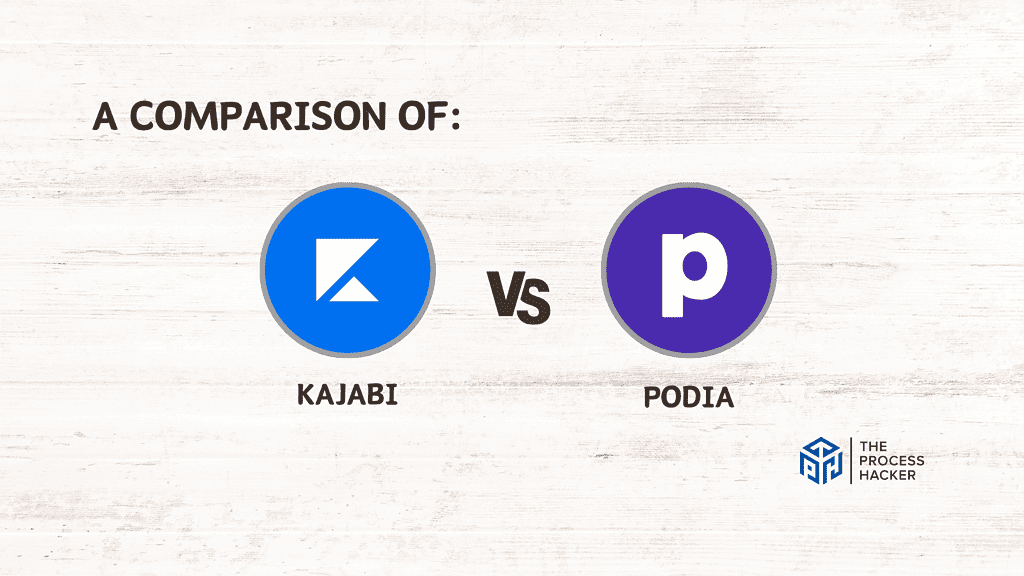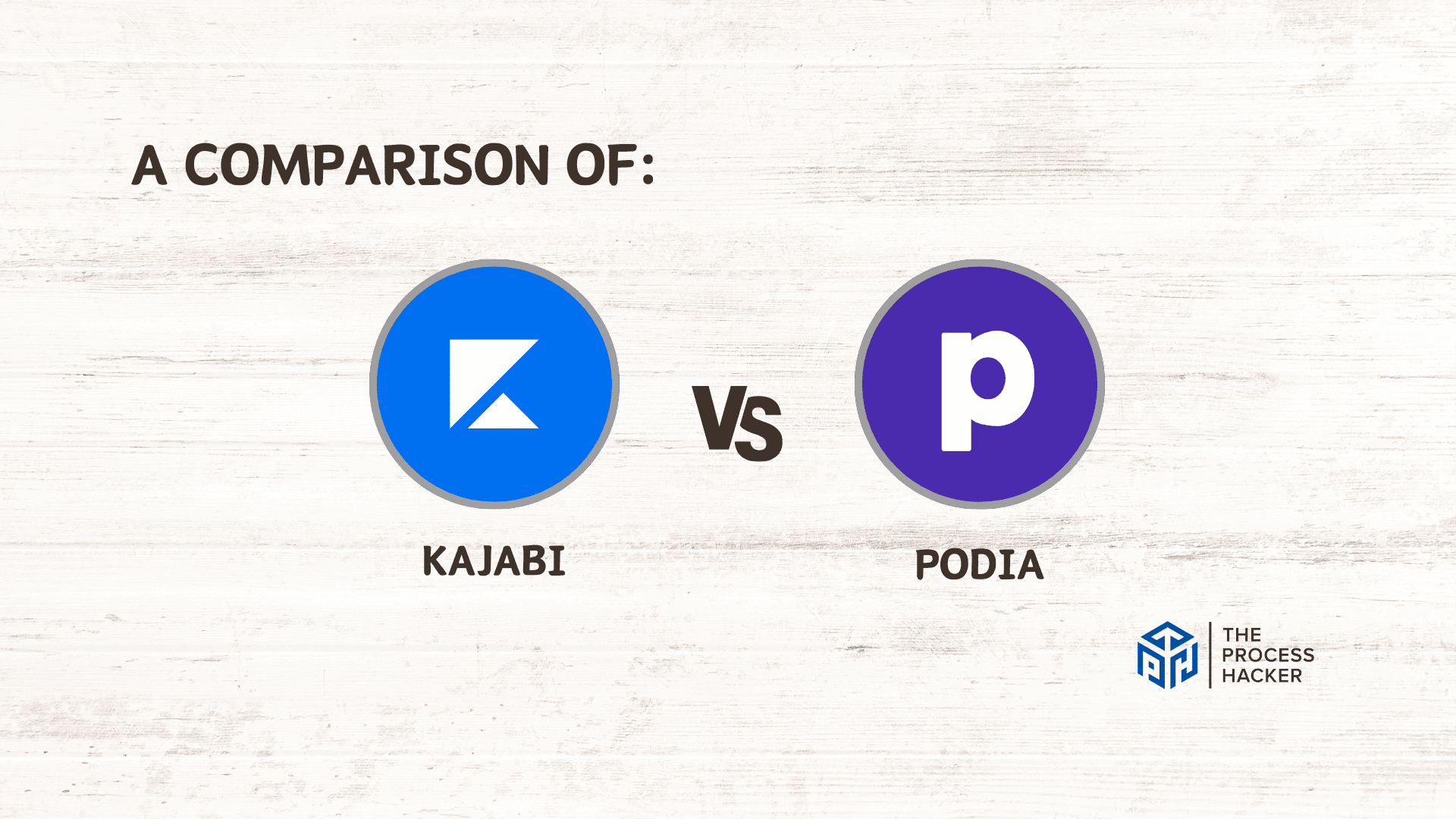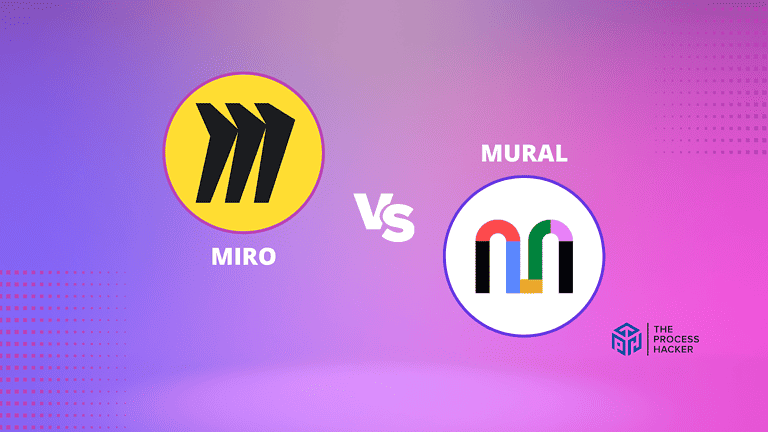Kajabi vs Podia: Which All-In-One Platform is Better For Online Courses?
As an entrepreneur, building your online course business is a big undertaking – but it doesn’t have to be stressful or overwhelming if you choose the right platform.
You want something intuitive to use that allows you to focus on what really matters – creating amazing content and helping your students succeed.
However, with so many options out there, including Kajabi and Podia, how do you know which one is the best fit?
If you purchase through our partner links, we get paid for the referral at no additional cost to you! For more information, visit my disclosure page.
Believe me, I’ve been in your shoes, trying to choose between these platforms. After much trial and error, we’ll discuss two of the most popular options: Kajabi and Podia!
Both offer all-in-one solutions for online courses, but which one reigns supreme?
In this blog post, I’ll break down the pros and cons of each so you can determine once and for all which platform should power your online course business.
Buckle up because we’re taking a deep dive into Podia vs Kajabi!
Brief Overview: Podia vs Kajabi
First, I’ll give you a quick overview of Podia vs Kajabi:
Kajabi
Kajabi is a comprehensive platform designed for entrepreneurs and businesses to create, market, and sell online courses. It offers extensive tools for course creation, email marketing, website building, and sales funnels, aiming to provide an all-in-one solution for digital course content creators.
Key Selling Points:
- Integrated course creation and marketing tools
- Advanced automation for email campaigns and sales funnels
- Customizable website templates and hosting
- In-depth analytics for tracking user engagement and sales
- Strong community support and educational resources
Podia
Podia is a user-friendly platform for creators focusing on simplicity and ease of use. It supports selling online courses, memberships, and digital downloads. Podia emphasizes direct creator-to-customer relationships, with features like email marketing, messaging, and custom website creation.
Key Selling Points:
- Simplified course creation process
- No transaction fees on sales
- Direct messaging feature for customer engagement
- Integrated email marketing tools
- Membership and digital download support alongside courses
Quick Verdict: Podia vs Kajabi
In support of this, Kajabi offers a suite of powerful tools designed for in-depth course creation, advanced marketing automation, and comprehensive sales funnel management. This platform caters especially to those who need a sophisticated, integrated system to handle complex online courses, digital products, and membership sites.
Its standout features include extensive customization options for course and website design, a wide array of marketing tools such as automated email campaigns, and detailed analytics to track your success. It’s ideal for you if you’re aiming to build a substantial online presence with diverse digital offerings.
Podia differentiates itself with its focus on simplicity and direct creator-to-customer interactions. This makes it an excellent choice for you if you prefer an easy-to-use platform without the complexity of extensive marketing and automation tools.
With Podia, you can quickly set up and sell your online courses, multiple-choice quizzes, memberships, and digital downloads. The platform offers a streamlined experience with features like direct messaging for customer engagement and integrated email marketing, all without transaction fees.
It’s an excellent option for you if your priority is a hassle-free, approachable tool to start selling online with minimal setup.
Product Overview: Podia vs Kajabi

What is it?
Kajabi is an all-in-one platform designed to help you create, market, and sell online courses, digital products, and membership sites. It integrates various tools for course creation, email marketing, and website building, all aimed at delivering a professional online teaching experience.
Podia is a streamlined platform that allows you to easily create and sell online courses, memberships, and digital downloads. It focuses on user-friendliness and direct engagement with your audience, providing tools for marketing, sales, and customer communication in one place.
Who is it for?
Kajabi is best suited for entrepreneurs, educators, and businesses seeking a comprehensive solution to manage extensive online courses and digital products. It’s ideal for you if you need advanced features like automation, detailed analytics, and customizable marketing tools.
Podia is tailored for individual creators, small online business owners, and educators who prefer a straightforward, no-fuss approach to online course delivery. It’s perfect for you if you value ease of use, direct customer interaction, and a quick setup without the need for technical expertise.
What makes it special?
Kajabi stands out with its extensive customization options, powerful automation capabilities, and a wide range of marketing tools. This platform provides detailed analytics and insights, helping you fine-tune your strategy and maximize your online course success.
Podia differentiates itself with its simplicity and focus on direct creator-to-customer relationships. The platform’s no transaction fee policy, integrated email marketing, and direct messaging features make it uniquely appealing for creators who want a personal and direct way to connect with their audience.
What does it do?
Kajabi offers an all-encompassing solution that includes course creation tools, a website and course builder, email marketing automation, sales funnels, and analytics. These features work together to provide a sophisticated platform for managing every aspect of your online course business.
Podia provides an intuitive interface for course creation and features for selling memberships and digital products. It includes essential tools for email marketing, customer messaging, and a customizable storefront, making it easy for you to start and grow your online presence.
Quick Comparison: Podia vs Kajabi
| Key Features | Kajabi | Podia |
|---|---|---|
| #1) Pricing | Winner | |
| #2) Free Plan | Winner | |
| #3) Design & Functionality | Winner | |
| #4) Course Creation Tools | Winner | |
| #5) Membership Site | Winner | |
| #6) Email Marketing Tools | Winner | |
| #7) Course Completion Certificates | Winner | |
| #8) Website Builder | Winner | |
| #9) Customer Support | Tie | Tie |
| #10) Digital Downloads | Tie | Tie |
| #11) Payment Processing | Tie | Tie |
| #12) Community Building Tools | Winner | |
| #13) Video Hosting | Winner | |
| Overall | Winner |
Feature Comparison: Podia vs Kajabi
Let’s compare the features of these all-in-one online course platforms so you can make the right decision for you and your entire online business.
#1) Pricing
When looking at Kajabi, the pricing starts at $149 per month for its Basic Plan. This plan suits individuals or small businesses just beginning to offer online courses. Kajabi offers Growth and Pro Plans for those looking to scale up, which provide more advanced features, catering to larger businesses or those with growing audiences.
On the other hand, Podia’s pricing is more accessible, starting at just $9 per month for its Starter Plan. This basic plan is ideal for those just starting out and wanting to test the waters without a significant financial commitment.
However, it’s important to note that online courses are only available as drafts in this plan. To fully launch and sell courses, you should upgrade to the Mover or Shaker plans, which offer unlimited courses and additional features.
In terms of pricing, Podia has the edge for beginners or those with a tight budget, thanks to its low entry cost and the ability to start small. However, for businesses that are ready to invest more in comprehensive features and scalability, Kajabi is the preferable choice.
Verdict: For pricing, Podia has a better basic plan for budget-conscious or just starting-out content creators, while Kajabi is suited for businesses ready to invest in more advanced features.
#2) Free Plan
Kajabi provides you with a 14-day free trial, allowing you to explore its features without any initial investment. This trial period is excellent for getting a hands-on feel of Kajabi’s interface and functionality, especially if you’re considering its more advanced plans for your online courses.
On the other hand, Podia offers a more comprehensive free trial, including all the features of its Starter Plan (except for Google Analytics integration). This approach gives you a broader understanding of what Podia can offer, making it easier for you to decide if it’s the right fit for your needs, especially if you’re focused on the essential features without the need for advanced analytics.
Regarding the free plan, Podia offers a more inclusive experience during the trial period, allowing you to access most features available in its Starter Plan. This can be particularly beneficial if you want to thoroughly test the all-in-one platform before committing financially.
Verdict: Podia is the more favorable option for the free plan due to its comprehensive trial offering.
#3) Design & Functionality
Kajabi presents a robust and intuitive design that offers a wealth of features. It boasts customizable templates for your courses and landing pages, making creating a unique and professional-looking platform easy. Plus, its functionality extends to marketing automation, allowing you to streamline your operations.
In contrast, Podia has a clean and user-friendly interface that’s easy to understand, even for beginners. However, it offers less customization than Kajabi, focusing more on simplicity and ease of use. Its functionality is straightforward, making it a good choice if you’re after a no-frills platform.
Kajabi offers more advanced customization features and marketing tools. While Podia’s simplicity is appealing, Kajabi provides more depth for those looking to create a bespoke online course experience.
Verdict: Podia vs Kajabi for design and functionality? Kajabi is the better choice.
#4) Course Creation Tools
Kajabi offers a robust set of tools for course creation. You’ll find advanced customization options and a variety of templates to make your courses stand out. Additionally, Kajabi provides integrated marketing tools, which can be a game-changer for promoting your courses.
On the other hand, Podia impresses with its user-friendly interface and simplicity. It’s great for beginners or those who prefer a more straightforward approach. Podia also supports various course content formats and provides essential tools needed for course creation, though it may lack some advanced features.
Based on the comprehensive set of tools and built-in marketing features, Kajabi is the better course creation tool. These aspects make it a more versatile and powerful platform, especially if you’re looking to create and effectively market your online courses.
Verdict: For creating and selling online courses, Kajabi is the superior choice.
#5) Membership Sites
Kajabi lets you create a fully customized membership site. You can design your own layout, organize content into categories, and even set up a community forum for your members. This platform offers different levels of memberships, allowing you to segment your audience and deliver content accordingly.
On the flip side, Podia also allows for membership site creation but with a simpler approach. It supports content organization and member management but doesn’t offer as much customization as Kajabi. Moreover, it lacks the feature to create multi-level memberships.
Kajabi stands out with its advanced features and customization options. The ability to provide different levels of memberships gives you more flexibility in managing your content and your audience.
Verdict: Podia vs Kajabi for membership sites? Kajabi is recommended for those needing advanced features and customization.
#6) Email Marketing Features
Kajabi packs a punch as an email marketing platform. It allows you to create beautifully designed emails with its drag-and-drop builder, automate your email sequence, and segment your audience for more personalized messages and opt-in forms. Additionally, you can track your email performance with detailed analytics.
Podia, however, offers simpler email marketing tools. You can send out newsletters and drip emails, but the platform lacks advanced features like automation and segmentation. Despite its simplicity, Podia’s email tool is easy to use and can get the job done for basic email marketing needs.
Kajabi leads in email marketing due to its advanced features, automation capabilities, and extensive customization options. This makes it a better choice for those who require more sophisticated email marketing strategies. While easier to use, Podia is more suited for simpler, less segmented campaigns.
Verdict: Podia vs Kajabi for your email marketing campaigns? Kajabi is the superior choice if you need advanced features and customization.
#7) Course Completion Certificates
Kajabi allows you to create and customize course completion certificates, providing a tangible reward for your students upon completing a course. These certificates can be fully tailored to match your brand and course aesthetics, offering a professional look. The process of creating and issuing certificates in Kajabi is also integrated with the course progress, making it automated and efficient.
In contrast, Podia does not offer built-in features for course completion certificates. To provide certificates to your students, you must use third-party tools or manually create and send them. This extra step can be cumbersome and less streamlined than Kajabi’s integrated solution.
Kajabi stands out due to its integrated, customizable, and automated certificate creation feature. This convenience and professionalism make it a more appealing choice for those who value offering certificates as part of their course completion experience.
Verdict: Kajabi is the clear winner for course completion certificates for its ease of use and integration within the platform.
#8) Website Builder
Kajabi offers a powerful website builder with a wide range of customization options. You can choose from various attractive and functional templates or build a site from scratch. This flexibility allows you to craft a unique online presence that aligns closely with your brand and course offerings.
Podia’s website builder, while more straightforward and user-friendly, offers fewer customization options than Kajabi. It’s designed for ease of use, allowing you to quickly set up a clean, professional-looking website. However, the trade-off is less flexibility in design and layout compared to Kajabi.
When evaluating these platforms for their website-building capabilities, Kajabi stands out for its extensive customization options and range of templates, making it ideal if you want more control over your site’s design. Podia, however, is an excellent option if you prefer simplicity and ease of use, though it has some limitations in customization.
Verdict: For the website builder, Kajabi is the better choice for its comprehensive customization options and flexibility, particularly if you seek a highly tailored website.
#9) Customer Support
Kajabi provides extensive customer support, including 24/7 live chat support, email support, and a comprehensive knowledge base. This ensures that you can get assistance whenever you need it, whether it’s a technical issue or a query about using the platform. Kajabi also offers community support, where you can interact with other creators.
Podia also offers strong customer support, with live chat and email support available. Their response times are usually quick, and the support team is known for being helpful and knowledgeable. However, unlike Kajabi, Podia’s live chat isn’t available 24/7.
Regarding customer support, both Podia and Kajabi excel, but Kajabi has a slight edge due to its round-the-clock live chat support. This can be especially crucial if you work in different time zones or need immediate help. Both platforms, however, are commendable for their dedication to supporting creators.
Verdict: Podia vs Kajabi for creator support? Kajabi is the better choice for its 24/7 availability, but Podia is also a strong contender with its responsive and effective support team.
#10) Digital Downloads
Kajabi allows you to create and sell a variety of digital products, including downloads like eBooks, PDFs, and audio files. Their system supports a range of file types and offers a straightforward process for uploading and organizing your digital content. The platform also includes features for secure distribution to your customers.
Podia shines in the digital downloads arena, emphasizing simplicity and ease of use. You can sell a wide range of digital products, including eBooks, PDFs, cheat sheets, and more. Podia’s interface is particularly user-friendly, making it easy for you to upload and manage your digital products.
Both Podia and Kajabi offer robust features regarding digital product creation and management. Kajabi provides a robust and secure system for a variety of digital products, while Podia stands out for its ease of use and straightforward approach. The best choice depends on your preference for either a more comprehensive feature set or simplicity and user-friendliness.
Verdict: For digital product creation, both Kajabi and Podia are excellent choices, with Kajabi offering more robust features and Podia excelling in ease of use.
#11) Payment Processing
Kajabi offers integrated payment processing through Stripe and PayPal, allowing you to handle transactions directly within the platform. This integration facilitates seamless and secure payments, both for one-time purchases and recurring subscriptions. Kajabi’s system also provides detailed sales page analytics to help you track your revenue and understand your sales trends.
Podia also supports payment processing through Stripe and PayPal, ensuring secure and efficient transactions. It stands out with its straightforward fee structure, which is transparent and easy to understand. Podia ensures that setting up and managing your payment gateway is hassle-free, even if you’re new to online sales.
Regarding payment processing, both Kajabi and Podia offer robust and secure solutions with their Stripe and PayPal integrations. The choice between the two depends on your preferences for specific features like sales analytics in Kajabi or the simplicity of Podia’s fee structure.
Verdict: For Payment Processing, Kajabi and Podia are strong contenders, each offering secure and efficient payment solutions catering to different needs and preferences.
#12) Community Building Tools
Kajabi offers robust community-building tools. It allows you to create a dedicated space for your customers to interact, share insights, and ask questions. This can foster a sense of belonging among your customers and encourage engagement.
Podia, on the other hand, provides a simpler community feature. You can create a community tied to a specific product or a general one for all your customers. While it lacks some of the advanced features of Kajabi, it still provides a space for customer interaction.
When comparing community-building tools, Kajabi has a clear advantage with its more comprehensive and integrated community features, ideal for creating a dynamic and interactive learning environment. Podia’s community tools are more basic and suited for you if you prefer simplicity and a more straightforward approach to audience engagement.
Verdict: Kajabi is the superior choice for community-building tools because of its extensive and integrated features, making it ideal for fostering a vibrant online community.
#13) Affiliate Program
Kajabi offers a comprehensive affiliate program feature that allows you to recruit, manage, and pay affiliates directly through the platform. This feature is highly integrated with Kajabi’s marketing and payment systems, making it easy for you to track affiliate performance and manage commissions. It’s particularly robust for those with an extensive affiliate network or plan to scale their affiliate program.
Podia’s affiliate program is more streamlined and user-friendly, suitable for those who are new to affiliate marketing or prefer a simpler approach. While it covers the basics of affiliate management, including tracking and payments, it might not offer the same features of functionality and customization features as Kajabi’s affiliate system.
Comparing the two, Kajabi’s affiliate program is more feature-rich and offers greater control and scalability, making it the better choice for those with extensive affiliate marketing needs. However, if you’re looking for a straightforward affiliate system to manage, Podia is a solid choice.
Verdict: Kajabi is the recommended choice for your affiliate program for its comprehensive and integrated features, especially if you are looking to utilize affiliate marketing extensively in your strategy.
Final Thoughts on Kajabi vs Podia
After thoroughly reviewing and testing out both Podia vs Kajabi, each platform has its unique strengths tailored to different needs!
Kajabi stands out for its comprehensive suite of advanced features, making it the go-to choice if you’re looking for a robust, all-in-one solution. Its superior email marketing tools, extensive course and website creation customization, and integrated community-building tools make it ideal for those who want a high degree of control and scalability in their online course platform.
On the other hand, Podia is a fantastic option if you prioritize simplicity and user-friendliness. It’s particularly suitable for beginners or those who prefer a more straightforward course creation and management approach.
Drawing from extensive experience and trying out both platforms, I recommend Kajabi for its versatility and depth of features. It’s particularly well-suited if you want to build a comprehensive online learning experience with a strong brand presence. Kajabi’s ability to support your growth and adapt to complex needs makes it a superior choice overall.
So, if you’re ready to take your online courses to the next level, Kajabi is the way to go!
Its blend of functionality, customization, and professional-grade tools will give you everything you need for a successful online course platform.









